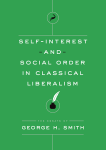In this book, George H. Smith asks and answers a standard question raised by critics about classical liberalism or libertarianism: “How can justice be maintained in a society if most of its members lack the social virtues essential to a free society?” (emphasis in original).
The assumption underlying the critics’ question seems to be that if we act in our self-interest, as classical liberalism affirms, we will only act virtuously if “we deem voluntary interaction conducive to our own ends” or if “we fear the legal consequences of aggression.” According to the critics’ assumption, classical liberalism is little more than “atomized individualism.”
Smith refutes this assumption by surveying the arguments of classical liberal philosophers in the English tradition, such as David Hume, Joseph Butler, Frances Hutcheson, and Adam Smith. These writers affirm the self-interested character of human action but deny that its motivation can be reduced to “psychological egoism,” which they called “the selfish system.” They also affirm other motivations for human action, including benevolence.
The distinction between self-interest and psychological egoism, together with the recognition of other motivators for human action, means that classical liberalism can explain the fundamental drive for social order without reference to the supervening hand of the state. This doesn’t mean that the state plays no role, of course. In classical liberalism, the state’s most fundamental role is to “enforce the rules of justice.” What classical liberalism calls into question is the notion that the state need to do more than enforce justice in order to promulgate social order. According to classical liberalism individuals and civil society have sufficient resources apart from the state to do that.
Self-Interest and Social Order in Classical Liberalism is a short but valuable read in the history of classical liberal ideas.
 Book Reviewed
Book Reviewed
George H. Smith, Self-Interest and Social Order in Classical Liberalism (Washington DC: Cato Institute, 2017).
P.S. If you found my review helpful, please vote “Yes” on my Amazon.com review page.

